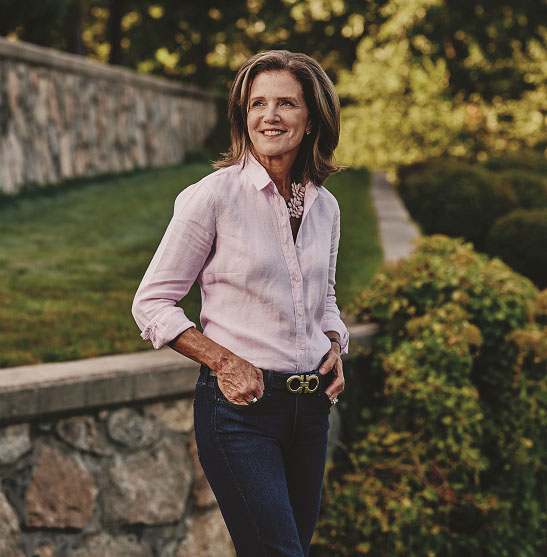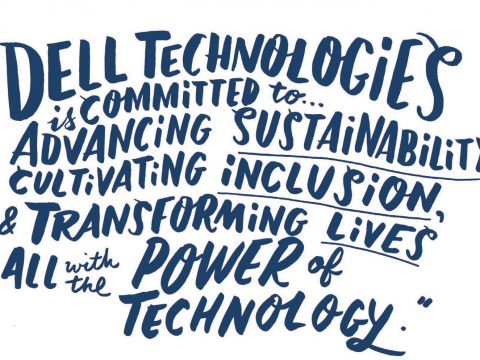Dell Technologies Chief Responsibility Officer Christine Fraser shares her renewed optimism of the future with tech.

What was the path that led to your role as Chief Responsibility Officer (CRO) at Dell Technologies?
CHRISTINE FRASER: It’s probably a non-traditional path. I’ve spent my career embedded in the business across a variety of functions: strategy, operations, marketing, business development, partner development, and leading the Integration Program Office on behalf of EMC.
Through these leadership positions, I found myself with platforms to deepen my personal engagement in programs that matter to me. I became involved in mentorship and sponsorship programs, particularly for women, and later in programs for professionals of color. I’ve had teams that are dispersed across the globe and saw firsthand the impact of community engagement initiatives led by our team members. And I have also experienced increased expectation from our customers and partners related to social impact, whether that’s corporate social responsibility, or diversity and inclusion.
So when the CRO role presented itself, I was excited about the opportunity to apply my experience and business acumen to the commitments Dell Technologies makes to our team members, our customers and partners, the environment, and communities.
How has this role impacted your life outside of the office?
CF: The greatest impact has really been a heightened awareness and a renewed sense of optimism. The role exposes me to the magnitude of the environmental and social issues that are facing humanity. But even as these issues seem very daunting, I also get to witness the remarkable initiatives that are being led both formally and informally by Dell Technologies through business commitments and the efforts of the thousands of team members across the globe. Seeing that complete picture—and also being able to direct the focus areas—makes me eternally optimistic that technology and people can solve some of the biggest challenges facing humanity.
“Optimism underpins all innovation; it’s that core belief that there is always more we can do…Optimism is the single greatest force in achieving social impact.”
—Christine Fraser, Chief Responsibility Officer, Dell Technologies
Is there a particular area of social impact you are most passionate about?
CF: What I’m most passionate about is ensuring that we’re affecting real change and material outcomes, which requires locking our focus on initiatives adjacent to who we are—and who we are is one of the largest technology providers in the world. That means we’ve got to invest in programs that leverage the use of our technology to solve complex issues. And it also means we need to recognize that we are one of the largest employers of technology jobs, so we have to broaden the aperture and affect the changes of inclusiveness required to attract, develop, and reflect the workforce of the future. To me, it’s about leading by example.
As one of the largest tech companies, we recognize we produce and ship a lot of “things.” And as such, we need to be committed to maximizing every opportunity to recycle and reuse materials, and we need to hire more diversity in our own business to ensure we’re building technology solutions that reflect the diversity of society.
Dell Technologies reported meeting its 2020 social impact goals early. What were some of those accomplishments?
CF: The 2020 Legacy of Good plan was established in 2013, and through the hard work and commitments of our global team members, and the business, we’re in the fortunate position to have reported early achievement of many of the 2020 goals.

We reused 100 million pounds of recycled content in Dell Technologies’ new products, and we reduced the energy intensity of our product portfolio by 64 percent. Our team members delivered 5 million service hours to communities globally. We’ve enabled 60 percent of eligible team members to participate in flexible work options. We’ve created STEM educational opportunities for thousands in communities around the globe through programs like our solar-powered learning labs. And we’ve rolled out the Many Advocating Real Change program focused on mitigating unconscious bias–to 100 percent of our executives, and now we’re moving it down throughout the organization.
YOU MAY ALSO LIKE: After-School Programs and STEM: The Key to an Inclusive Tech Future
We’re humbled to continue to receive recognition from organizations like LinkedIn as a 2019 top company, from the Human Rights Campaign 2019 Corporate Equality Index as one of the best companies to work for LGBTQ equality, and to be included on Ethisphere Institute’s list of the world’s most ethical companies. So, we’ve had a little bit of an early victory with 2020 goals, but beyond the celebration, we’re now able to extend our commitments to 2030.
What were some of the lessons that came out of that work that you are applying to your 2030 goals?
CF: There were a few. The first was reinforcement of what we’ve known all along: our team members are incredibly passionate about social impact. We need to find more ways to harness their talents and capabilities because their ideas can make a really big difference.
“We’ve learned that real progress requires deep alignment with our business priorities and understanding the role our technology can play in solving complex problems.”
We’ve learned that many of our customers and partners care about this now more than ever. They have increased expectations of us. Perhaps most exciting, many are eager to consider partnering around shared goals. This dynamic is presenting the opportunity for us to harness our relationships for greater impact.
We’ve learned that real progress requires deep alignment with our business priorities and understanding the role our technology can play in solving complex problems. We need to be very clear about where Dell Technologies can apply its resources—the breadth of our portfolio, the passion of our team members, and the commitment of the business—for impact.
YOU MAY ALSO LIKE: Responsibility in the Next Decade, a blog post by Christine Fraser
And we’ve learned that innovation is really important. Not everything we do is going to be executed at scale. But if we continue to invest time and resources into innovation, it can lead to really significant change.
So our focus for 2030 is to harness the resources and the talent that we have throughout Dell Technologies. It’s about the passion of our people, passion of our customers, the commitment to innovation, and deep alignment of our social impact initiatives with the business strategy.
What is Dell Technologies’ social impact vision for 2030?
CF: Our 2030 vision, which we call Progress Made Real, is rooted in three core pillars that we believe best represent our commitments for social impact: advancing sustainability, cultivating inclusion, and transforming lives—all with the power of technology. Foundational to the vision is our commitment to upholding ethics and privacy.
We’re going to continue to commit to areas like the circular economy and protecting human rights, including the rights of our own team members, as well as the many people in our extended supply chain.
We will up-level our focus on empowering the future workforce and expanding access to the tech jobs of the future. That doesn’t just mean programs for students but also supporting the re-entry of those who have temporarily stepped away and the re-skilling of those already here. The jobs of the future will require skills that we have to ensure our existing team members develop. And it also means building a culture of inclusion where everyone feels a sense of belonging.
We are also making a concerted effort to scale our impact through collaboration with our customers, partners, and peers across our industry because we recognize that no one of us is going to do this on our own.
You described ethics and privacy as foundational to the 2030 vision. Why did Dell Technologies specifically outline ethics and privacy as part of social impact?
CF: We did a lot of work in developing our goals, and that included a company-wide survey asking team members what they feel are important initiatives for Dell Technologies to commit to for 2030. We also surveyed many of our leaders and conducted external analysis. One thing that surfaced consistently was concern around ethics and privacy. While ethics and privacy have always been core to everything we do at Dell—it’s part of our ethos and our culture—it’s also becoming increasingly important as we build emerging technologies that are intimately connected to our daily lives. It’s really a concern for the entire tech industry, and we recognized the need to specifically call it out as a way of reinforcing our commitment to operating with the highest ethical standards.
With so many social and environmental issues to address, what is your advice to business leaders about how to choose the right social impact initiatives?
CF: My advice is to start with your overall business strategy and your core strengths, then create a social impact agenda that is adjacent to those. I’m a “less-is-more” person, so I believe that when you select impactful initiatives that are core and adjacent to your business, it’s easier to mobilize people and resources to support success. For us at Dell Technologies, we want to harness our technology and our team members for the greatest benefit, and we want to make sure that our team members reflect the diversity of our society and feel that they can be their authentic and best selves at work.
How have you rallied Dell Technologies team members to take part in social impact initiatives?
CF: Our success is directly tied to how we engage and mobilize our 150,000+ team members, so we focus on fostering an environment where volunteering and giving back is valued and encouraged. Great ideas can come from anywhere within the organization, so we look for ways for our team members to voice their opinions and provide their input on our social impact agenda, on what they are passionate about, and where they think Dell Technologies should be focusing our initiatives. And then we do a lot to communicate examples and celebrate the kinds of work that people are doing to support us.
Our leadership plays a critical role in not only defining our priorities, but also aligning their particular interests or leadership agendas to those priorities. Many of our leaders recognize that they have a platform, and that if they model the commitments we are making at a corporate level, it matters to their teams and people will follow.
You mentioned having renewed optimism. How do you define optimism in the digital future?
CF: Optimism underpins all innovation; it’s that core belief that there is always more we can do. And optimism sustains our belief that we can influence the outcome—that technology can solve problems, that people can solve problems, and that regardless of how challenging the problems are, there are innovations and commitments we can make to solve them. Optimism is the single greatest force in achieving social impact.